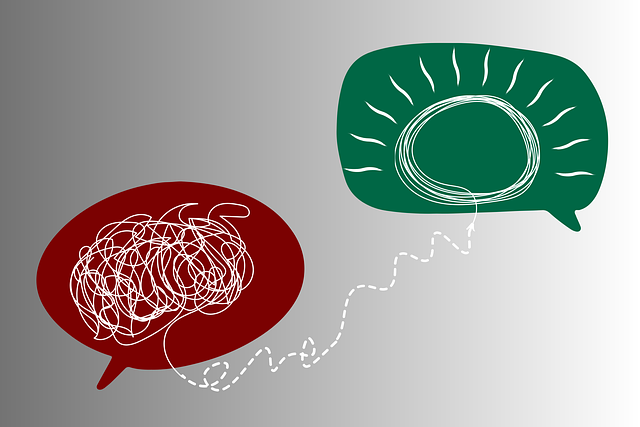In Louisville's play therapy setting, recognizing healthcare provider burnout is critical for maintaining a healthy environment. Emotionally demanding work with children can lead to stress and burnout if unaddressed. Burnout signs include decreased motivation, cynicism, or physical/emotional exhaustion. Access to mental health resources varies in Louisville, making community outreach programs essential to reduce provider burden. Implementing emotional intelligence training, play therapy sessions, and Mental Wellness Journaling Exercises Guidance can improve job satisfaction and self-care practices. Effective burnout prevention strategies include holistic approaches like EI development, social skills training, and cultural sensitivity, fostering resilience and supportive work environments. Comprehensive Louisville Play Therapy programs, mental health education, compassion cultivation, and stress reduction methods combat burnout, benefiting both therapists and the broader mental health ecosystem.
“In Louisville, healthcare providers working in play therapy settings face unique challenges that can lead to burnout. This article explores strategies to prevent and combat burnout among these essential professionals. We delve into recognizing the signs of burnout specific to Louisville’s play therapy community, offering practical solutions for sustained well-being. Additionally, we emphasize the role of a supportive environment, highlighting initiatives within Louisville’s mental health community to foster resilience and mitigate burnout.”
- Recognizing Burnout Among Healthcare Providers in Louisville Play Therapy Settings
- Implementing Effective Burnout Prevention Strategies for Sustained Well-being
- Fostering a Supportive Environment to Combat Burnout in Louisville's Mental Health Community
Recognizing Burnout Among Healthcare Providers in Louisville Play Therapy Settings

In Louisville’s play therapy settings, recognizing burnout among healthcare providers is paramount to maintaining a healthy and effective therapeutic environment. The demands of working with children and their families can be emotionally taxing, leading to increased stress levels and potential burnout if left unaddressed. Observing signs such as decreased motivation, cynicism, or physical and emotional exhaustion can indicate that a provider may be experiencing burnout. This is especially concerning in a city like Louisville, where access to mental health resources varies across communities.
To combat this issue, implementing community outreach programs focused on mental wellness can help reduce the burden on individual providers. Encouraging play therapy sessions for children and offering Emotional Intelligence (EI) training for healthcare professionals can foster healthier interactions and improve job satisfaction. Additionally, promoting Mental Wellness Journaling Exercises Guidance can provide providers with an outlet to process their experiences and emotions, enhancing self-care practices in Louisville’s play therapy settings.
Implementing Effective Burnout Prevention Strategies for Sustained Well-being

Implementing effective burnout prevention strategies is paramount for healthcare providers to maintain sustained well-being, particularly in demanding fields like Louisville play therapy. These strategies extend beyond mere stress management; they encompass a holistic approach that addresses emotional intelligence, social skills training, and cultural sensitivity in mental healthcare practice. By fostering resilience and cultivating a supportive work environment, healthcare professionals can mitigate the risks associated with burnout, enhancing their ability to deliver quality care.
Emotional intelligence plays a pivotal role in preventing burnout by equipping providers with tools to manage their own emotions and empathize with clients. Social skills training facilitates better communication and collaboration among team members, fostering a sense of belonging and reducing feelings of isolation. Cultural sensitivity in mental healthcare practice ensures that providers are adept at meeting the unique needs of diverse patient populations, promoting inclusivity and enhancing therapeutic outcomes. Integrating these dimensions into burnout prevention strategies not only benefits individual therapists but also strengthens the overall mental health ecosystem in Louisville.
Fostering a Supportive Environment to Combat Burnout in Louisville's Mental Health Community

In Louisville’s mental health community, fostering a supportive environment is a proactive approach to combat burnout among healthcare providers. This involves implementing Mental Health Education Programs that equip therapists with the latest research and skills in play therapy, ensuring they can effectively support clients while maintaining their well-being. By integrating Compassion Cultivation Practices into the fabric of these programs, therapists are encouraged to nurture self-care and empathy, creating a positive feedback loop that enhances both client outcomes and provider satisfaction.
Additionally, Stress Reduction Methods should be incorporated to help professionals manage the inherent demands of their work. This can include mindfulness techniques, relaxation exercises, and time management strategies tailored to Louisville’s unique play therapy practices. Such initiatives not only mitigate burnout but also foster a culture where therapists feel valued, understood, and empowered in their roles, ultimately enriching the mental health landscape in Louisville.
In Louisville, addressing healthcare provider burnout within play therapy settings is paramount for maintaining high-quality mental health services. By recognizing the signs of burnout and implementing targeted strategies, such as fostering supportive environments and providing access to resources, we can create a more sustainable and resilient workforce. These efforts are crucial not just for the well-being of providers but also for ensuring the best possible care for Louisville’s community members seeking play therapy services.












